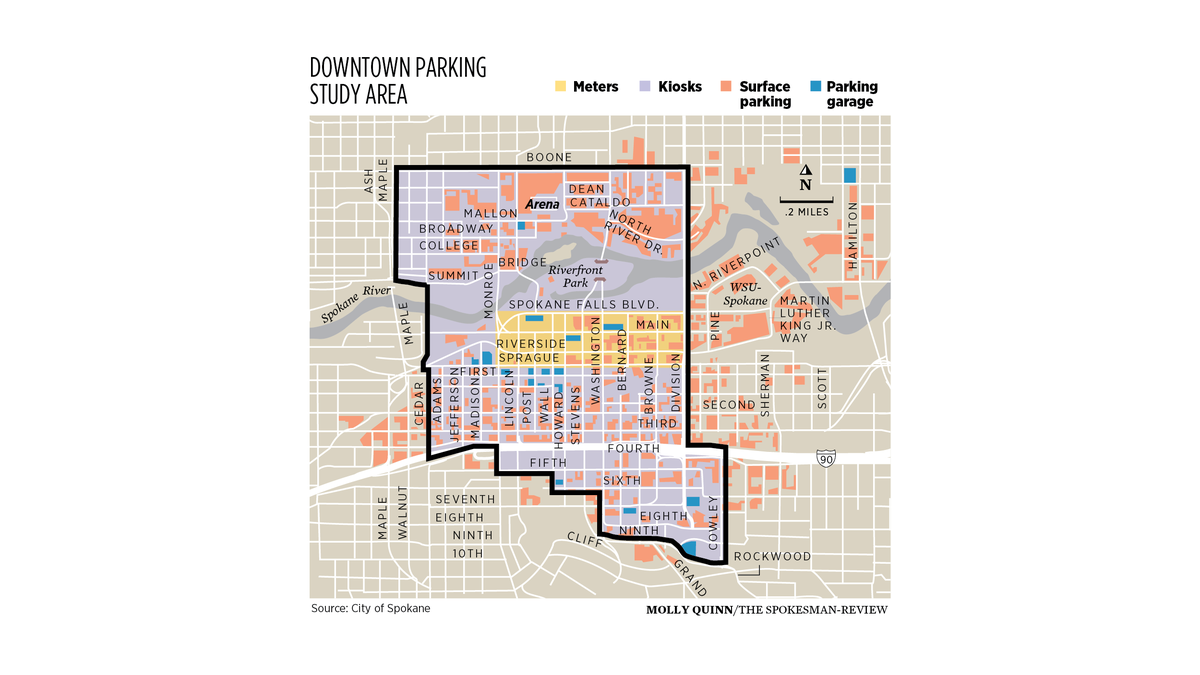This column reflects the opinion of the writer. Learn about the differences between a news story and an opinion column.
Getting There: City parking fund faces nearly $10 million in costs as it prepares to roll out new downtown rates, system

If you feel any special fondness for plugging a parking meter, now’s the time to head downtown and plink a coin in the good old-fashioned metal heads that have long lined the streets.
By this summer, those could be technological relics as the city of Spokane’s Parking Services department replaces its outmoded meters with a high-tech system of meters and kiosks with per-hour charges that officials can adjust depending on demand (and with City Council approval).
While the new meters are set to still accept cash, the existing slot boxes will be phased out and replaced with digitally enabled devices that each apply to two spaces. The new technology will also allow the meters to be integrated into a new system that allows parking enforcement officers to use license plate recognition technology to catch scofflaws.
And it won’t just be the technology that will change. So will the prices, with a premium space potentially costing as much as $5 an hour and a less-desirable spot costing as little as 50 cents. Fines, too, are expected to increase.
The changes are part of an overhaul of the downtown parking system that the city, with the aid of various consulting firms, has been studying and preparing to implement for years. Parking officials hope to have it up and running this summer, according to Kirstin Davis, communications manager with the city’s Neighborhood, Housing and Human Services Department.
One main aim is to increase the efficiency of the system by implementing the right mix of carrots and sticks to achieve an ideal 85% occupancy rate. That means drivers can always find a spot, businesses can rest assured their customers will have somewhere to park and the city can get a good return on its investment in the parking system.
Getting a good return on the city’s investment will be key, because the cost of that investment is $3.6 million.
And that isn’t the only major cost facing the city’s parking system.
The city also expects it will face a $3.3 million revenue shortfall for its parking fund when the COVID-19 pandemic finally – and hopefully – ends later this year.
The parking fund will also have to be tapped for another $2.7 million in 2025. That’s when a balloon payment is due as a result of a city decision in 2016 to refinance the debt remaining on $25.2 million in bonds that were taken out in 2005 to pay for a settlement in a federal lawsuit related to the River Park Square parking garage. The mall and the garage are owned by Centennial Properties, an affiliate of the Cowles Co., which also publishes The Spokesman-Review.
Add all that up, and the city’s parking fund is on the hook to pay out $9.6 million over the next four years.
To do so, city accountants have come up with a plan to take out a series of cash loans from the Spokane Investment Pool, a fund of city reserves that’s invested, and to then pay those loans back with revenue from the parking program.
“Basically, the city is internally funding in advance of future revenue, much like personally taking cash from your personal investment account to replace your water heater and promising to pay your investment account back over time,” said Tonya Wallace, the city’s chief financial officer.
The city plans to take out $1.2 million loans from its investment pool each year for the next three years to pay for the new parking system. Then, in 2025, it will tap the SIP again to make the bond’s balloon payment.
The plan was the subject of discussion at last week’s meeting of the Parking Advisory Committee, a group of 13 City Council appointees. Next month, the council’s Urban Experience Committee plans to hear about the proposal. Ultimately, though, City Council members will have to sign off.
But it won’t only be up to lawmakers to decide the fate of the city’s parking system.
With parking revenue down 40% in 2020 from the year before and annual costs of the new system expected to run about $440,000, the viability of the plan to stabilize the parking fund will also depend on strong demand from drivers returning downtown when COVID-19 is contained.
And despite expectations of remote-work arrangements persisting after the pandemic, city officials are counting on that happening.
To keep the parking fund in the black, they anticipate revenue returning next year to almost where it was in 2018 and 2019, when the city parking system brought in more than $4 million a year.
That’s a lot of mostly virtual coins plugged in a lot of digital meters.
Work to watch for
Crews will resume work on the North Spokane Corridor on Monday, when they close Ralph Street from Cleveland Avenue to Jackson Avenue. The work is estimated to take about a month, weather permitting.
Marshall Road at Cheney-Spokane Road will be closed Tuesday and Wednesday from 4 a.m. to 1 p.m. for BNSF repairs.
Lyons Avenue will be completely closed between Division and Lidgerwood streets this week for construction work.
The northbound curb lane of Washington Street between Boone Avenue and Maxwell/Mission Avenue will be closed Monday through March 12 for Avista work.
The intersection of Panorama Drive and Strong Road will be flagged all directions through March 12 for Quanta work.
